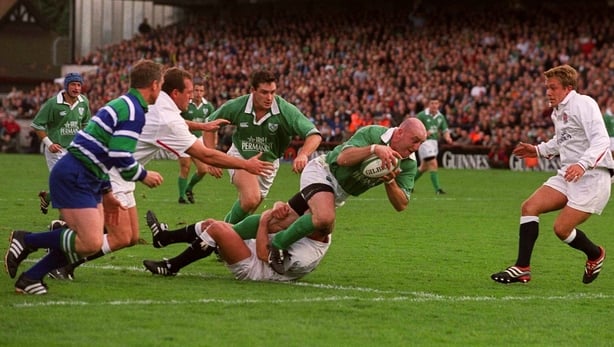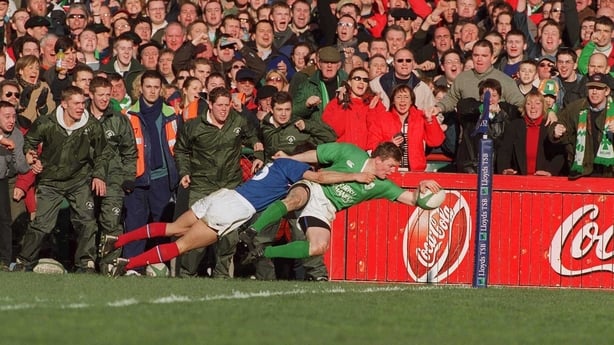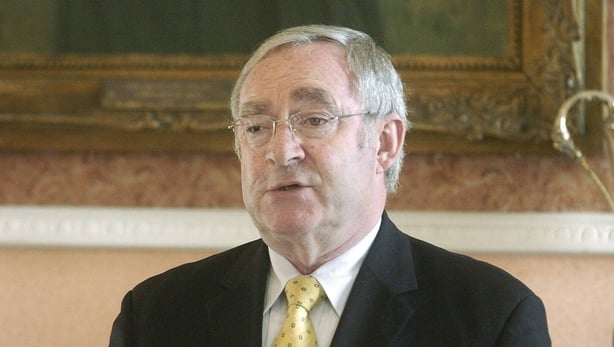Though no dates have been pencilled in, it appears likely the 2020 Six Nations will follow the path of the 2001 edition by coming to completion in autumn.
Failing that, the tournament will be declared null and void, or else a series of 0-0 draws will see England crowned champions on points difference.
It's hard to imagine such an outcome will spark wild scenes of celebration in London.
Neither did their 2001 triumph, in which a glum-faced Matt Dawson and co traipsed out of the dressing room and onto the Lansdowne Road pitch to hold the trophy aloft, having just had their Grand Slam dreams smashed by Ireland.
Remarkably, it was the third successive year that an English Grand Slam charge had been foiled on the final day. At least in 2000 and 2001, they still won the Six Nations title. In 1999, Scott Gibbs' dramatic late try saw Scotland win the last ever Five Nations championship on points difference.

All that accumulated pain was one of the reasons Clive Woodward's team were so tightly wound and remorseless in the Grand Slam decider in Dublin in 2003.
In '01, it was Ireland who finished second in the tournament, their best performance in the competition since 1985, only being beaten to the title by England on points difference.
We say "only". The points difference gap was truly mammoth, England having racked up a 'differential' (as Joe Schmidt always called it) of +149, compared to Ireland's +40.
In their four games in the spring, England's narrowest wins were, jointly, a 44-15 win over Wales in Cardiff and 48-19 at home to France.
They racked up 80 points against Italy and beat Scotland like a drum - 43-3 was the final score. Fortunately, Woodward was a more dull and businesslike figure than Eddie Jones, whose face would presumably wear a permanent sneer if his team put up such scores.
It's occasionally been claimed - in podcasts and other such forums - that the 'Foot and Mouth' business "cost" Ireland a Grand Slam in 2001, on the basis that the team's only loss arrived in Murrayfield after a seven-month gap to their previous game.
This is an extremely dubious argument which forgets that Woodward's imperious England team had a roughly similar gap between their penultimate game, played on 7 April, and their sucker punch loss in Dublin on 20 October.
We need your consent to load this rte-player contentWe use rte-player to manage extra content that can set cookies on your device and collect data about your activity. Please review their details and accept them to load the content.Manage Preferences
Though England were regarded as unbackable favourites for the tournament, Ireland started the 2001 campaign well.
Rob Henderson scored a hat-trick on the opening weekend in Rome and that was followed by a first home win over France in 18 years.
Irish rugby was suddenly suffused with this strange feeling called 'optimism'. The turn of the millennium signalled a bright new dawn for Irish rugby, after the dismal 1990s, in which the national team died several thousand deaths.
The Heineken Cup, particular the performances of Munster, provided much of the spark for the revival in the early noughties.
Irish rugby fans weren't yet demanding Grand Slams and were instead just happy to be beating the likes of France and - God help us - Scotland again.
The renaissance was about to be stalled from an unlikely direction.

On 19 February, two days after Ireland beat the French 22-15 in Lansdowne Road, the first new case of an old disease was detected at Cheale Meats abattoir in Essex.
The UK had witnessed an outbreak of Foot and Mouth disease in 1967, which resulted in 430,000 animals being slaughtered across 2300 farms.
Now, the disease had re-surfaced. Over the following days, several more cases were confirmed in farms across Essex and then another was reported in the Northumberland in the north-east.
By Wednesday 21 February, two days after the first reported case, the Irish government announced that the import of both live animals and animal products such as meat and milk was banned.
A case was soon discovered in Northern Ireland and imports from north of the border were included in the ban. Extra Gardaí were drafted in to patrol a border. The SDLP Minister for Agriculture Bríd Rogers rejected a proposal from Iain Paisley Jnr that NI retaliate with a ban on imports from the Republic.
While it had the potential to do huge damage to the Irish economy, Foot and Mouth disease presented no direct threat to human life.
The spread of the disease across the UK saw the slaughter of six million cows and sheep, devastating livelihoods and costing Britain dearly. Samaritans ads were released showcasing the distress and sorrow of farmers following the cull of their livestock.
Minister for Agriculture Joe Walsh warned within days of the outbreak that the issue should be seen as "nothing less than a national issue which has the potential to adversely affect, either directly or indirectly, the well-being of everyone in this country, and our response must reflect the gravity of the situation."
Over the spring and summer, dipping one's foot in disinfectant became second nature in Ireland and a host of sporting and cultural events were banned.
Cheltenham died a slow death. On Saturday, the 25th, Walsh announced the chances of the festival going ahead were "worse than 50:50". On 1 March, the Irish trainers announced they wouldn't be travelling. The UK-based contingent still held out hope it go ahead, initially postponing it for a month before finally cancelling it altogether on 1 March.
On Tuesday 27 February, Ireland named their team for their first ever Six Nations game in the Millennium Stadium. Within a few hours, there was no game on.

The IRFU heeded the call from the government to postpone the game.
"We have to look at the bigger picture," Philip Browne said that evening. "This is a game of rugby. There's a much bigger picture here in terms of people's livelihoods within the island of Ireland. We've taken that on board and we're fully cognisant of the difficulties faced by the department of agriculture."
The rest of the Six Nations programme was run off over the spring, with only the three remaining Ireland games being left outstanding.
The Foot and Mouth outbreak ran out of steam over the summer, the last case occurring in Cumbria in September.
By then, Ireland's Six Nations campaign had already re-started with a dispiriting and somewhat surprising 32-10 loss to Scotland, their ninth successive defeat in Murrayfield, and a display more reminiscent of the 90s than the noughties.
Fears of a swift return to the doldrums were dispatched following a heavy win in Cardiff and the memorable triumph over England, Ireland's first taste of victory in the fixture since the unlikely back-to-back wins of 1993 and 1994.
Though there was one case of Foot and Mouth in the Republic, in Jenkinstown in Louth, resulting in the cull of healthy livestock, the Irish efforts to prevent the spread of the disease in the country proved successful.
While it had the potential to do huge damage to the Irish economy, Foot and Mouth disease presented no direct threat to human life.
Covid-19 represents a very different threat, which renders the rest of the Six Nations far more of an after-thought than it was 19 years ago.


